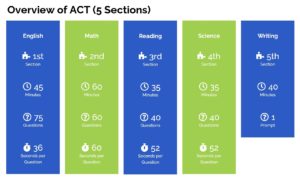
If you’re a non-native English speaker, taking college admission exams like ACT can be pretty intimidating—luckily, there are a number of ACT Accommodations for English Language Learners available which help ELL students attain equal ground to their native-speaking peers.
Since most of us, when possible, avoid activities that cause stress, ESL students (sometimes also called international students) are often reluctant to focus on preparing for standardized tests. This creates an additional challenge for teachers, who often wonder how to motivate students for standardized tests. In addition to employing general strategies for reducing foreign language anxiety for test takers, there are also some ACT-specific tips we recommend.
In this article, we’ll cover what’s on the ACT, explain the various ACT accommodations for English language learners that are available, help you understand how to request specific accommodations, and leave you with some helpful resources to prepare for the ACT.
For ELL students planning to take the SAT, don’t forget to check out our post on how to approach SAT Prep for ESL Students.
What’s on the ACT?
The ACT is a standardized test typically taken by high school juniors and seniors as part of the college application process. It assesses students’ knowledge and understanding in four subject areas: English, Math, Reading, and Science. In addition, students have the option of adding the Writing section, which consists of a single essay question.

As you can see, the ACT as a whole asks students to answer 215 multiple-choice questions in just under 3 hours, with the optional addition of a single 40-minute essay section.
Wait, what about the SAT—is that the same thing? Should I take the ACT or SAT?
What Are English Language Learning Supports for the ACT?
The ACT offers four different supports for English Language Learners:
-
- Extended time (up to, but not exceeding, time-and-a-half). This accommodation requires an advance request no later than four weeks prior to your test date.
- Word-to-word bilingual dictionaries, which must appear on the ACT’s approved list. Note that these dictionaries do not provide definitions, just the equivalent word(s) in a student’s native language. These dictionaries should be available to students on test day and do not require advance request.
- Test directions in a student’s native language. Native language test directions are available in 18 different languages. Translated test directions should be available to students on test day and do not require advance request.
- Testing in a small group or familiar environment. This accommodation requires an advance request no later than four weeks prior to your test date.
The ACT also offers a variety of accommodations for accessibility purposes, including written versions of verbal instructions, preferential seating, and the use of earplugs, to name a few.
Eligibility for ACT Accommodations
In order to receive these accommodations, students need to meet a few different criteria. First and foremost, the student must be enrolled at a school within the United States or a U.S. territory. Along with that, they must also meet the following stipulations:
- The student must have limited English proficiency.
- The student must be actively participating in an English language acquisition program.
- The student must be using similar English language supports in the classroom and during other tests and assessments.
How to Request Accommodations for the ACT
Requesting accommodations for the ACT as an English language learner is quite simple, but you will need to work with a school official to address your needs. This is helpful because the official will handle the difficult part of the process for you.
Your first step will be to create an account on the ACT website and sign up for your desired test date. The online registration page will ask you for your high school’s code, as well as your accessibility needs.
After submitting your information, you’ll receive an email to send to your school official. Along with the email, you’ll have to submit a completed Consent to Release Information ACT form to your school official. Once you submit these documents to your school official, they will handle the rest of the process for you.
To be approved, the ACT will look for answers to the following questions:
- Do the desired accommodations offer a fair shot compared to standard test takers?
- Are the accommodations appropriate to the student’s level of English language proficiency?
- Does the student meet the requirements for receiving English language learning supports?
Preparing for the ACT
Although ACT accommodations for ESL students can offer you a more pleasant test-taking experience, the most effective way to reduce standardized test anxiety is to practice the content that will be covered on the ACT!
ACT prep for ESL students is broadly similar to the type of prep a native English-speaking student would complete. Taking practice tests and brushing up on ACT vocabulary words are the best way to ensure you’re ready for the real deal. With that said, it’s helpful to keep a few things in mind to keep your anxiety level down and your confidence level up.
Consider some of these helpful tips for ESL students:
- Create a study plan. Staying organized will keep your stress levels down and you’ll be able to focus on the content you’re studying. Without a plan, it’s easy to feel aimless during your prep sessions; this makes them less efficient. With a plan, you can optimize whatever time you have available.
- Improve your grammar. Mastering the grammar rules that are commonly tested on the ACT will help you better prepare yourself for understanding the content in the Reading and Language portions of the test. If you struggle with reading, check out our handy “Tips for Reluctant Readers.”
- Focus on your weaknesses. Make a mental note of which areas you feel the least confident about. These should be the concepts and skills you work on the most in the weeks leading up to your ACT test day.
- Keep track of your progress. This is a helpful motivational tool for those days when you feel like you aren’t getting anything right. Seeing a visual representation of the progress you’re making will boost your morale.
- Take plenty of practice tests. Using practice tests, like the official ones offered by the ACT or Piqosity’s full-length ACT practice tests, helps you become familiar with the test’s format. This in turn reduces test anxiety. Additionally, since most students improve their scores the second or third time they take the ACT, having taken practice tests in advance means that a student’s “first” ACT is not, in fact, their first experience of the test.
Particularly for ELL students, studying vocabulary is crucial to building standardized test confidence. Piqosity has you covered, with extensive FREE vocabulary practice at three levels:
Although these lists were designed to help students preparing for the ISEE, they work just as well for general vocabulary-building. To practice these words, consider making flashcards, grouping them by definition, and using them in sentences. These activities will help you familiarize yourself with what each one means and how to identify context clues too.
You may also benefit from exploring our FREE series of deep-dive blogs dedicated to each section of the ACT:
- ACT English Strategies
- ACT Math Strategies
- ACT Reading Strategies
- ACT Science Strategies
- ACT Writing Strategies
Generally, ELL students have fewer language-related difficulties on the Mathematics section of the ACT—but you still might find it useful to review our strategies for overcoming math anxiety.
Prepare for the ACT With Piqosity!
For students, utilizing at-home courses, like the ones offered here at Piqosity, are an important tool for language enrichment and test prep. These courses are a great way for ELL students to gain familiarity with the English language and the nuances of the ACT from the comfort of their own home.
Our Reasonably Priced ACT Test Prep Packages Include:
- Up to 10 Full ACT or SAT Practice Tests
- Tutorial Lessons with Video Explanations
- Adaptive, Gamified Practice
- Options for Parent-Tutor Consultations
- Score Reports and Real-Time Score Predictions
- Personal “Strengths and Weaknesses” Analysis
- Printable PDFs
- Piqosity Virtual Tutor
- …and Much More!
Still not convinced? That’s okay—you can register for FREE (no credit card information required) for our Community package, which gives you access to a diagnostic test and many of our key platform tools.
But wait, there’s even more! If you’re interested in further remediation, enrichment, and test prep, check out Piqosity’s latest curriculum offerings, which are particularly useful for ELL students: our online English Language Arts Courses. Each course includes more than 100 different Reading Passages, accompanied by dozens of Concept Lessons and Tutorial Videos!
- 5th Grade English Course
- 6th Grade English Course
- 7th Grade English Course
- 8th Grade English Course
- 9th Grade English Course (New!)
- 10th Grade English Course (Coming Soon!)
- 11th Grade English Course
So what are you waiting for? Get a boost up on your English language proficiency and ACT test prep today with Piqosity!
More Educational Resources by Piqosity:


